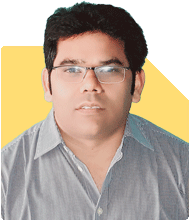45K salary, no investments: How to secure my family's future?
Ramalingam Kalirajan |7453 Answers |Ask -Follow
Mutual Funds, Financial Planning Expert - Answered on Sep 02, 2024
He has an MBA in finance from the University of Madras and is a certified financial planner.
He is the director and chief financial planner at Holistic Investment, a Chennai-based firm that offers financial planning and wealth management advice.... more

Namaste sir .. I am a contract employee earning about 45 K monthly may be it may increase in coming years ..my wife is a home maker and a child of 14 yrs .I have been investing 3000 rs monthly in 2013 in ppf account .other than this I have not invested at any part becoz of very less knowledge and fear of market ups and downs . In 2 yrs my son's education may matter and no health insurance ..as I am a Insulin dependent... confused in health insurance also ..as insulin dependent won't get insurance ... Please do guide me about health insurance and for my son's education and good reliable investment plans ....worried .. please do guide me Venugopal Please do guide me
You have been investing Rs 3,000 monthly in a Public Provident Fund (PPF) account since 2013, which is a good start. However, you are concerned about market volatility, lack of knowledge in investments, and health insurance, especially being insulin-dependent.
Let’s explore your options and devise a strategy that can help you secure your family’s financial future.
Three line spaces
Health Insurance Concerns
Health insurance is critical, especially given your health condition. As an insulin-dependent diabetic, obtaining health insurance can be challenging but not impossible. You can explore the following options:
Senior Citizen Health Plans: These are designed for people with pre-existing conditions. Although you might be younger, some policies cater to those with chronic conditions like diabetes.
Critical Illness Plans: These can provide coverage for severe health conditions, including complications from diabetes. They pay a lump sum upon diagnosis of covered illnesses.
Diabetes-Specific Health Insurance: Some insurers offer plans specifically for diabetic patients. These plans might cover diabetes-related hospitalization and treatment.
While these options might come with higher premiums, securing health insurance is vital to prevent draining your savings in case of medical emergencies. You can also consider increasing your savings in your PPF or a separate health fund to prepare for unexpected health costs.
Three line spaces
Planning for Your Son’s Education
Your son’s education will require significant funds, especially in just two years. Since your income is limited and your PPF is a long-term investment, you need a reliable plan to meet this expense.
Education Loan: Consider an education loan to cover the bulk of the expenses. This option allows you to spread the cost over several years while focusing on maintaining your cash flow for other needs.
Short-Term Debt Funds: You can invest in debt funds that have a tenure matching your son’s education timeline. These funds are less volatile and provide more predictable returns than equity funds.
Systematic Investment Plan (SIP): Though your time horizon is short, a SIP in a balanced fund can still provide growth with moderate risk. This option could supplement your savings.
You may also discuss with your son the possibility of part-time work or scholarships to ease the financial burden.
Three line spaces
Exploring Reliable Investment Plans
Given your fear of market ups and downs, it's understandable that you prefer stable and reliable investments. Let’s look at options that can provide growth without excessive risk:
Public Provident Fund (PPF): Continue your PPF investments, as this is a secure and tax-free option with decent returns. You can increase your monthly contribution if possible.
Debt Mutual Funds: These are safer than equity funds and provide better returns than fixed deposits. They are ideal for investors like you who want stability with a bit of growth.
Fixed Deposits (FDs): You can allocate a portion of your savings to FDs, which offer guaranteed returns. Consider laddering your FDs, where you invest in multiple deposits with different maturity dates to maintain liquidity.
Balanced Mutual Funds: These funds invest in a mix of equities and debt, offering a balanced approach. They provide some growth potential while managing risk. This could be a good option if you want to start investing in the market without taking too much risk.
Recurring Deposits (RDs): If you prefer a more conservative approach, RDs with banks or post offices are good options. They allow you to save a fixed amount monthly and earn interest, similar to an FD.
Three line spaces
Addressing Your Fear of Market Volatility
Your hesitation to invest due to market volatility is common. The key is to choose investments that align with your risk tolerance. Let’s address how you can manage this fear:
Start Small with SIPs: Systematic Investment Plans (SIPs) in balanced or debt-oriented funds can help you enter the market gradually. The disciplined approach of SIPs smoothens the impact of market volatility over time.
Diversification: Spread your investments across different asset classes, such as PPF, debt funds, and FDs. This reduces the risk of loss from any single investment.
Stay Informed: Educating yourself about the market and different investment products can reduce fear. Understanding how markets work helps you make informed decisions without anxiety.
Consult a Certified Financial Planner: Working with a Certified Financial Planner (CFP) can provide you with tailored advice. They can help you choose the right investments based on your risk appetite and financial goals.
Three line spaces
Building an Emergency Fund
Before making any investments, ensure that you have an emergency fund. This fund should cover at least 6-12 months of your expenses. Given your current income and expenses, this might seem challenging, but you can build it gradually.
Automate Savings: Set up automatic transfers to a separate savings account. This account should be dedicated solely to emergencies.
Start with Small Amounts: Even Rs 1,000 or Rs 2,000 per month can build up over time. The important thing is to be consistent.
Use Liquid Funds: You can also consider liquid mutual funds for your emergency fund. These funds offer better returns than a savings account while maintaining liquidity.
Three line spaces
Preparing for Future Income Growth
You mentioned the possibility of an increase in your income in the future. When that happens, it’s important to allocate the additional income wisely:
Increase Investments: Gradually increase your SIPs, PPF contributions, or other investments. This will help you build wealth faster without taking on too much risk.
Enhance Health Insurance: If your income increases, consider upgrading your health insurance plan to cover more potential health issues.
Plan for Retirement: Start thinking about your long-term retirement goals. Even a small monthly investment in a balanced mutual fund or a pension plan can grow significantly over time.
Three line spaces
Final Insights
Venugopal, your concerns are valid, and it’s good that you are seeking advice now. You have a strong foundation with your PPF investments and a stable income.
Focus on securing your health by exploring diabetes-specific health insurance plans. This will protect your savings from being depleted by medical expenses.
For your son’s education, consider a mix of short-term debt funds, SIPs, and possibly an education loan. This approach will help you manage this significant expense without straining your finances.
When it comes to investments, start small with SIPs in balanced or debt-oriented funds. This will help you overcome your fear of market volatility while allowing your money to grow.
Lastly, remember to build an emergency fund to handle any unexpected expenses. This will give you peace of mind and financial security.
Best Regards,
K. Ramalingam, MBA, CFP
Chief Financial Planner
www.holisticinvestment.in
You may like to see similar questions and answers below
Ramalingam Kalirajan |7453 Answers |Ask -Follow
Mutual Funds, Financial Planning Expert - Answered on May 26, 2024
Ramalingam Kalirajan |7453 Answers |Ask -Follow
Mutual Funds, Financial Planning Expert - Answered on Jul 10, 2024
Ramalingam Kalirajan |7453 Answers |Ask -Follow
Mutual Funds, Financial Planning Expert - Answered on Jul 23, 2024
Ramalingam Kalirajan |7453 Answers |Ask -Follow
Mutual Funds, Financial Planning Expert - Answered on Jul 25, 2024
Prof Suvasish Mukhopadhyay |276 Answers |Ask -Follow
Career Counsellor - Answered on Jan 06, 2025
Dr Dipankar Dutta |736 Answers |Ask -Follow
Tech Careers and Skill Development Expert - Answered on Jan 06, 2025
Dr Dipankar Dutta |736 Answers |Ask -Follow
Tech Careers and Skill Development Expert - Answered on Jan 06, 2025
Milind Vadjikar |840 Answers |Ask -Follow
Insurance, Stocks, MF, PF Expert - Answered on Jan 06, 2025
Dr Dipankar Dutta |736 Answers |Ask -Follow
Tech Careers and Skill Development Expert - Answered on Jan 06, 2025
Milind Vadjikar |840 Answers |Ask -Follow
Insurance, Stocks, MF, PF Expert - Answered on Jan 06, 2025
Nayagam P P |4033 Answers |Ask -Follow
Career Counsellor - Answered on Jan 06, 2025
Onkar Singh |26 Answers |Ask -Follow
Career Management, Skills Development Expert - Answered on Jan 06, 2025
Kanchan Rai |474 Answers |Ask -Follow
Relationships Expert, Mind Coach - Answered on Jan 06, 2025
Kanchan Rai |474 Answers |Ask -Follow
Relationships Expert, Mind Coach - Answered on Jan 06, 2025



























